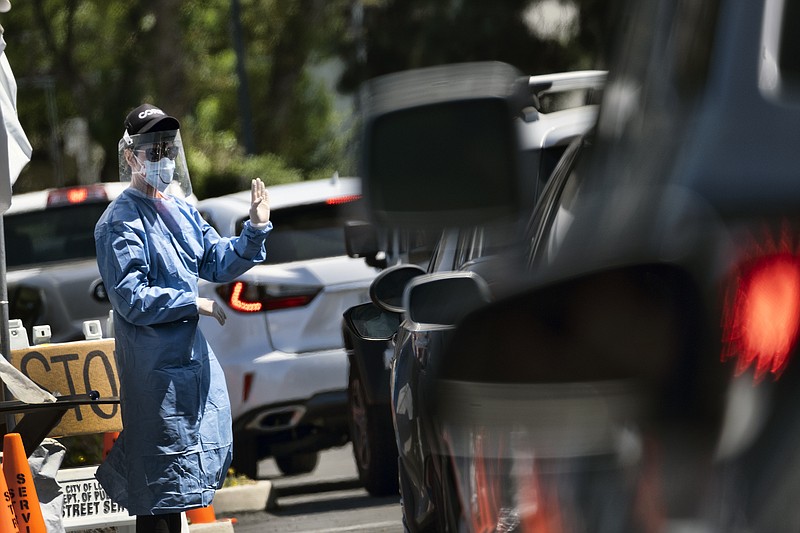LOS ANGELES (AP) - With ample coronavirus tests and not enough sick people seeking them, the mayor of Los Angeles recently did something on a scale no other major U.S. city had done - allow anyone with or without symptoms to be tested as often as they want.
A website to book a test was quickly swamped by residents in the nation's second-largest city and the surrounding county who couldn't get tested under more stringent guidelines and were concerned they were infected or could be asymptomatic carriers unwittingly exposing others.
But despite overbooking to compensate for a third of the people who didn't show up, the city still has thousands of tests that aren't being used each week, according to figures provided to the Associated Press by the mayor's office.
"Wasted tests at a time when we still have insufficient testing is really unfortunate," said Dr. Eric Topol, head of the Scripps Research Translational Institute, a San Diego-based medical research partnership. "I applaud what they're doing. The more people tested the better."
Mayor Eric Garcetti's vow to not let a test go to waste was the result of a partnership with a start-up company that developed an easy-to-administer test that doesn't rely on scarce supplies. But it was a significant departure from stricter state criteria and guidelines set by the health department the city shares with the county to limit tests to those who need them most.
It comes at a time when expanded testing is a cornerstone of the state's plan to ease its stay-at-home order and as Los Angeles County has become the epicenter of the virus outbreak and lags progress the rest of the state has shown.
While the virus was initially worse in Northern California, LA County, home to a quarter of the state's nearly 40 million residents, now accounts for more than half the state's deaths and a case count growing more rapidly than other major state counties. A large nursing home population, accounting for about half the county's deaths, and densely housed poor people are two main reasons.
When Garcetti opened up testing April 30, the county at large had relaxed some guidelines on who could get a test, with priorities going to the sickest and most vulnerable. It allowed testing some people without symptoms, including health care workers and emergency personnel most at risk of exposure.
From a public health perspective, wider testing could help determine the disease prevalence, though that would require random sampling, not people seeking to be tested, said Karin Michels, an epidemiology professor at the University of California, Los Angeles. And testing asymptomatic people comes at the expense of those who can't get a test.
"In a perfect world, you want to test the whole state, you want to test the whole country," Michels said. "We don't have enough test kits for everybody right now."
As the mayor removed limits on who could get tested, appointments filled up.
"I was stunned," said Sarah Wolf, who reserved a slot online after receiving a text alert. "There are people on the East Coast I know who can't get tested."
Los Angeles was not the first big city to offer free tests for everyone. Houston had done so nearly two weeks earlier but on a much smaller scale of 500-1,000 tests a day.
LA has paid $137 per test to Curative-Korva, a start-up run by Fred Turner, a 25-year-old British wunderkind. The firm was making sepsis tests when a worker there thought he was infected with coronavirus, couldn't get a test and devised one to collect a specimen by swabbing the inside of the mouth after coughing, spokesman Kyle Arteaga said.
The test got emergency approval from the Food and Drug Administration.
Los Angeles has 75,000 tests available each week to use mainly at eight drive-thru sites open six days a week, though it also tests at homeless shelters, nursing homes and recreation centers. It has conducted a weekly average of close to 57,000 tests in the two weeks since the mayor expanded testing.
The test is self-administered in cars and samples are dropped in a collection bucket, removing the need for a health care worker to collect the specimen and change gloves, masks and other protective clothing - all of which have been in short supply - with each test. It also uses a widely available swab, not the scarcely available long nasal swabs that have led to test shortages.
The Curative test, which is being used by the U.S. Air Force and sold to the states of Alaska and Florida, is one of several newer tests gaining attention. A saliva test developed by Rutgers University was given emergency FDA approval May 8 for home use.

